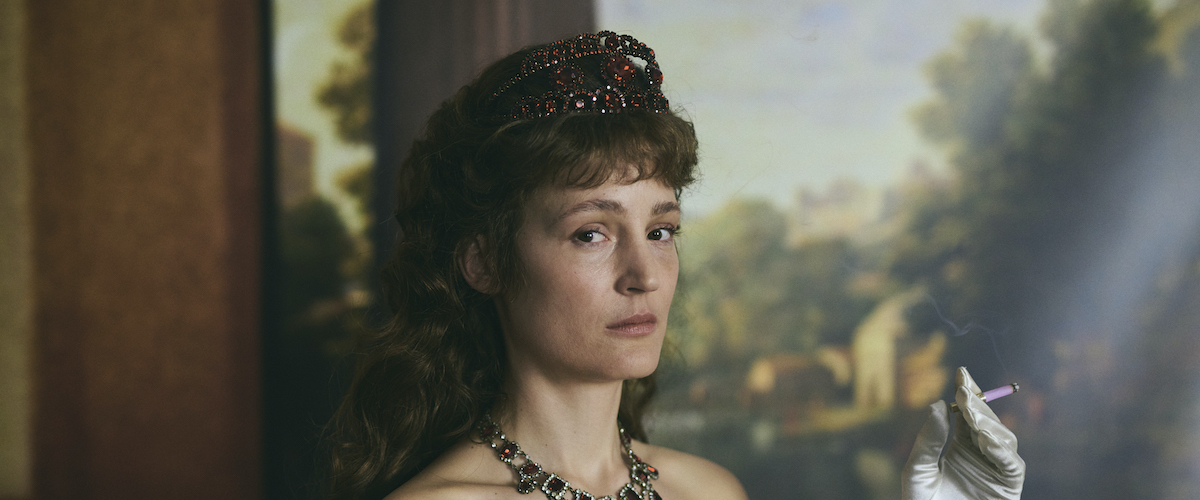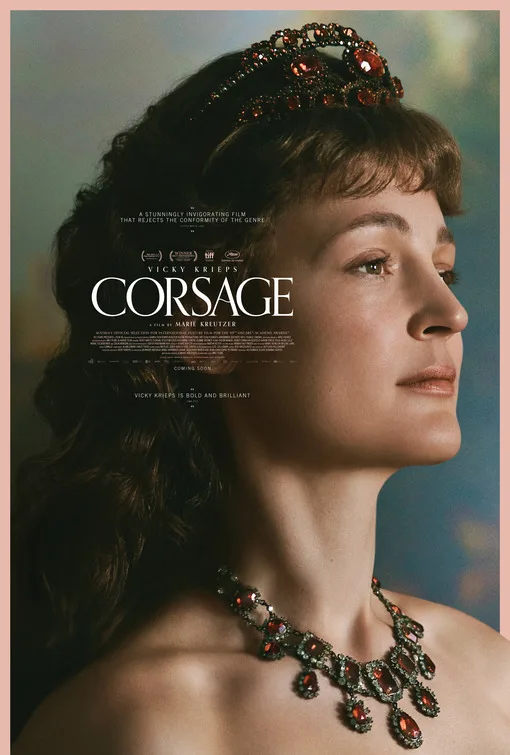Empress Elisabeth of Austria (Vicky Krieps) is getting dressed. Because she is a 19th-century empress, that means being dressed by attendants, but the one she wants is not there. With their hair in tight buns and white aprons tied with big bows, the maids pull Elisabeth’s corset strings as tightly as they can, writing down the day’s waist measurement. But Elisabeth tells them to call for Lotti, the only maid who can pull those strings a little bit tighter. The title of the film is “Corsage,” not as in the flowers pinned to the bodices of prom attendees and mothers of brides but as in the German word for a corset, the stiff 19th-century undergarment, often fortified with bones, laced to constrict a woman’s body so that it would conform to an idealized hourglass shape with a tiny waist. The sumptuous settings, elegiac tone, and Krieps’ layered performance bring us into the world of this woman caught between the expectations of her culture and her own desires.
The real-life Elisabeth married Emperor Franz Joseph I in 1854, when she was 16, making her Empress of Austria and Queen of Hungary. She has been portrayed in opera, ballet, a 1950s Austrian film trilogy, and a Netflix series called “The Empress.” The tragic murder-suicide of her son, the heir to the throne, and the woman he loved but was not allowed to marry was the subject of the 1968 movie “Mayerling.” A noted beauty, her appearance was her primary concern. Today she might be diagnosed as anorexic or bulimic. She weighed herself as often as three times a day and severely restricted what she ate, often fasting for days.
In this unabashedly fictionalized version, the corsage/corset serves as a metaphor symbolizing the constrictions of a life of privilege but no power. Within her small sphere, she can make demands of her ladies-in-waiting. But outside of her rooms, she is constantly being told what to do by her husband and her son. Over and over, we see her testing restrictions within the limits of her situation. She is told she must make an appearance at a formal event, the emperor pointedly noting that she has been criticized for not spending enough time in Hungary. She arrives, but then she faints. While anyone whose corset is laced so tightly it is difficult to breathe might faint from lack of oxygen, she knows how to fake a swoon.
Elisabeth has only limited control over her activities and relationships. But she is most concerned about the helplessness we all face: time and aging. “At 40, a person begins to disperse and fade” if all meaning comes from how she is perceived. Politics and threats on all sides bound the power of an empress. But the power of beauty is less subtle and less complicated for the brief time it is there. That is something any actress understands, which may be why Krieps is not only the star but the producer of this film.
Like Sofia Coppola’s “Marie Antoinette,” this film incorporates contemporary songs and fantasy fashion to provide context for a reimagining of the life of a historical figure who can be seen as an exemplar of what today we might call a struggle against the patriarchy. The chorus of one of the songs could be what is thrumming in her mind: “Go, go, go, go.” It is not only the corset that makes it difficult for Elisabeth to breathe, or even her sense that time has eroded her most important power source. When beauty is gone, a woman can lose more than power; she can all but disappear. Elisabeth flirts with men who may be drawn to her or may be drawn to her rank. But she is not interested in an affair; she only wants to prove that she can still be seen as desirable. She visits mental patients, bringing useless candied violets.
At one point in this film, Elisabeth poses for a portrait, bringing together all of her conflicts about wanting to be seen but being seen as she was, not as she is. No, more like wanting to be as she was. We see a glimpse of the future when she talks about the difference between paintings and photography, though she says that photographs are not as objective as they are supposed to be.
Of course, that is true of movies as well. Writer/director Marie Kreutzer makes no pretense of objectivity or fidelity to history. On the contrary, she uses this film to give Elisabeth more agency than she had in life, even a dream of escape. We wish it for her as much as she wishes it for herself.
Now playing in theaters.




















